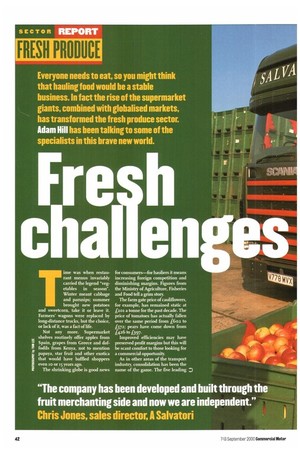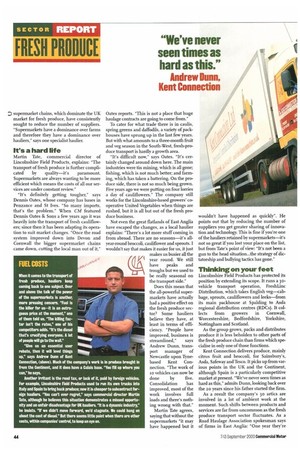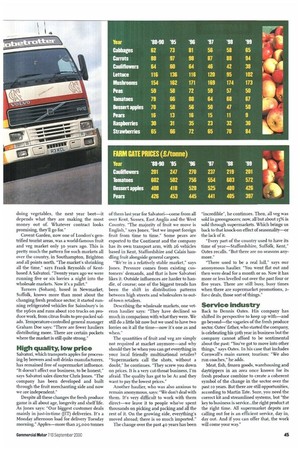"The company has been developed and built through the fruit merchanting side and now we are independent."
Page 44

Page 46

Page 47

If you've noticed an error in this article please click here to report it so we can fix it.
Chris Jones, sales director, A Salvatori
Time was when restaurant menus invariably carried the legend "vegetables in season". Winter meant cabbage and parsnips; summer brought new potatoes and sweetcom, take it or leave it. Farmers' wagons were replaced by long-distance trucks, but the choice, or lack of it, was a fact of life.
Not any more. Supermarket shelves routinely offer apples from Spain, grapes from Greece and daffodils from Kenya, not to mention papaya, star fruit and other exotica that would have baffled shoppers even io or 15 years ago.
The shrinking globe is good news for consumers—for hauliers it means increasing foreign competition and diminishing margins. Figures from the Ministry of Agriculture, Fisheries and Food tell a grim story.
The farm gate price of cauliflowers, for example, has remained static at f2oi a tonne for the past decade. The price of tomatoes has actually fallen over the same period from £602 to i572; pears have come down from £426 to £397.
Improved efficiencies may have preserved profit margins but this will be scant comfort to those looking for a commercial opportunity.
As in other areas of the transport industry, consolidation has been the name of the game. The five leading D
supermarket chains, which dominate the UK market for fresh produce, have consistently sought to reduce the number of suppliers. "Supermarkets have a dominance over farms and therefore they have a dominance over hauliers," says one specialist haulier.
It's a hard life
Martin Tate, commercial director of Lincolnshire Field Products, explains: "The transport of fresh produce is further complicated by quality—it's paramount. Supermarkets are always wanting to be more efficient which means the costs of all our services are under constant review."
"It's definitely getting tougher," says Dennis Oates, whose company has bases in Penzance and St Ives. "So many imports, that's the problem." When CM featured Dennis Oates & Sons a few years ago it was heavily into the transport of fresh cauliflowers; since then it has been adapting its operation to suit market changes. "Once the road system improved down into Devon and Cornwall the bigger supermarket chains came down, cutting the local man out of it," Oates reports. "This is not a place that huge haulage contracts are going to come from."
To cater for what trade there is in caulis, spring greens and daffodils, a variety of packhouses have sprung up in the last few years. But with what amounts to a three-month fruit and veg season in the South-West, fresh-produce transport is hardly a growth area.
It's difficult now," says Oates. "It's certainly changed around down here. The main industries were tin mining, which is all gone; fishing, which is not much better; and farming, which has taken a battering. On the produce side, there is not so much being grown. Five years ago we were putting on four lorries a day of cauliflowers." The company still works for the Lincolnshire-based growers' cooperative United Vegetables when things are rushed, but it is all but out of the fresh produce business.
Not even the great flatlands of East Anglia have escaped the changes, as a local haulier explains: "There's a lot more stuff corning in from abroad. There are no seasons—it's allyear-round broccoli, cauliflower and sprouts. I wouldn't say that makes it easier for us, it just makes us busier all the year round. We still have peaks and troughs but we used to be really seasonal on the transport side."
Does this mean that the all-powerful supermarkets have actually had a positive effect on the fresh produce sector) Some hauliers believe they have, at least in terms of efficiency. "People have improved, business is streamlined," says Andrew Dunn, transport manager of Newcastle upon Tynebased Kent Connection. "The work of ro vehicles can now be done by five. Consolidation has improved, most of the work involves full loads and there's nothing wrong with that."
Martin Tate agrees, saying that without the supermarkets "it may have happened but it wouldn't have happened as quickly". He points out that by reducing the number of suppliers you get greater sharing of innovation and technology. This is fine if you're one of the hauliers retained by supermarkets—it's not so great if you lost your place on the list, but from Tate's point of view: "It's not been a gun to the head situation.. the strategy of dictatorship and bullying tactics has gone."
Thinking on your feet
Lincolnshire Field Products has protected its position by extending its scope. It runs a vehicle transport transport operation, FreshLinc Distribution, which takes English veg—cabbage, sprouts, cauliflowers and leeks—from its main packhouse at Spalding to Asda regional distribution centres (RDCs). It collects from growers in Cornwall, Worcestershire, Bedfordshire, Yorkshire, Nottingham and Scotland.
As the group grows, packs and distributes produce it is less beholden to other parts of the fresh produce chain than firms which specialise in only one of those functions.
Kent Connection delivers produce, mainly citrus fruit and broccoli, for Sainsbury's, Asda, Safeway and Tesco. It picks up from various points in the UK and the Continent, although Spain is a particularly competitive market at present. "We've never seen times as hard as this," admits Dunn, looking back over the zo years since his father started the firm.
As a result the company's 30 artics are involved in a lot of ambient work at the moment. Such shifts between products and services are far from uncommon as the fresh produce transport sector fluctuates. As a Road Haulage Association spokesman says of firms in East Anglia: "One year they're doing vegetables, the next year beet—it depends what they are making the most money out of. Whatever contract looks promising, they'll go for."
Covent Garden, now one of London's gentrified tourist areas, was a world-famous fruit and veg market only 30 years ago. This is pretty much the pattern for such markets all over the country, in Southampton, Brighton and all points north. -The market's shrinking all the time," says Frank Reynolds of Kentbased A Salvatori. "Twenty years ago we were running five or six lorries a night into the wholesale markets. Now it's a pallet."
Turners (Soharn), based in Newmarket, Suffolk, knows more than most about the changing fresh produce sector; it started running refrigerated vehicles for Sainsbury's in the 19605 and runs about moo trucks on produce work, from citrus fruits to pre-packed salads. Temperature-controlled general manager Graham Doe says: "There are fewer hauliers distributing more. There are certain pockets where the market is still quite strong."
High quality, low price
Salvatori, which transports apples for processing by brewers and soft drinks manufacturers, has remained free of supermarket influence. "It doesn't affect our business, to be honest," says Salvatori sales director Chris Jones. "The company has been developed and built through the fruit merchanting side and now we are independent."
Despite all these changes the fresh produce game is all about age, longevity and shelf life. As Jones says: "Our biggest customer deals mainly in just-in-time (JIT) deliveries. It's a Monday afternoon load for delivery Tuesday morning." Apples—more than 25,000 tonnes of them last year for Salvatori—come from all over Kent, Sussex, East Anglia and the West Country. "The majority of fruit we move is English," says Jones, "but we import foreign fruit from time to time." Some pears are exported to the Continent and the company has its own transport arm, with 2.6 vehicles based in Kent, Staffordshire and Calais handling fruit alongside general cargoes.
"We're in a relatively stable market," says Tones. Pressure comes from existing customers' demands, and that is how Salvatori likes it. Outside influences are harder to handle, of course; one of the biggest trends has been the shift in distribution patterns between high streets and wholesalers to outof-town retailers.
Describing the wholesale markets, one veteran haulier says: -They have declined so much in comparison with what they were. We still do a little bit now but we used to have two lorries on it all the time—now it's one as and when."
The quantities of fruit and veg are simply not required at market anymore—and why should they be when you can get everything in your local friendly multinational retailer? "Supermarkets call the shots, without a doubt," he continues. "They screw you down on prices. It is a very cut-throat business, I'm afraid. The quality has got to be Ai and they want to pay the lowest prices."
Another haulier, who was also anxious to remain anonymous, says: "We don't deal with them. It's very difficult to work with them direct—we leave it to people who've spent thousands on picking and packing and all the rest of it. On the growing side, everything's moved abroad; there is so much imported."
The change over the past 40 years has been "incredible", he continues. Then, all veg was sold in greengrocers; now, all but about 15% is sold through supermarkets. Which brings us back to that knock-on effect of seasonality—or the lack of it.
"Every part of the country used to have its time of year—Staffordshire, Suffolk, Kent," Oates recalls. 'But there are no seasons anymore."
"There used to be a real lull," says our anonymous haulier. "You went flat out and then were dead for a month or so. Now it has more or less levelled out over the past four or five years. There are still busy, busy times when there are supermarket promotions, 2for-t deals, those sort of things."
Service industry
Back to Dennis Oates. His company has shifted its perspective to keep up with—and go beyond—the vagaries of the fresh produce sector. Oates' father, who started the company, is celebrating his 50th year in business but the company cannot afford to be sentimental about the past: "You've got to move into other things," says Oates. In his case that includes Cornwall's main earner, tourism: "We also run coaches," he adds.
Meat, fish, frozen goods, warehousing and daytrippers in an area once known for its fresh produce combine to create a coherent symbol of the change in the sector over the past io years. But there are still opportunities, according to Martin Tate. Sure, you need the correct kit and streamlined systems, but "the key to business is service...the right product at the right time. All supermarket depots are calling out for is an efficient service, day in, day out. And if you can offer that, the work will come your way."
















































































































